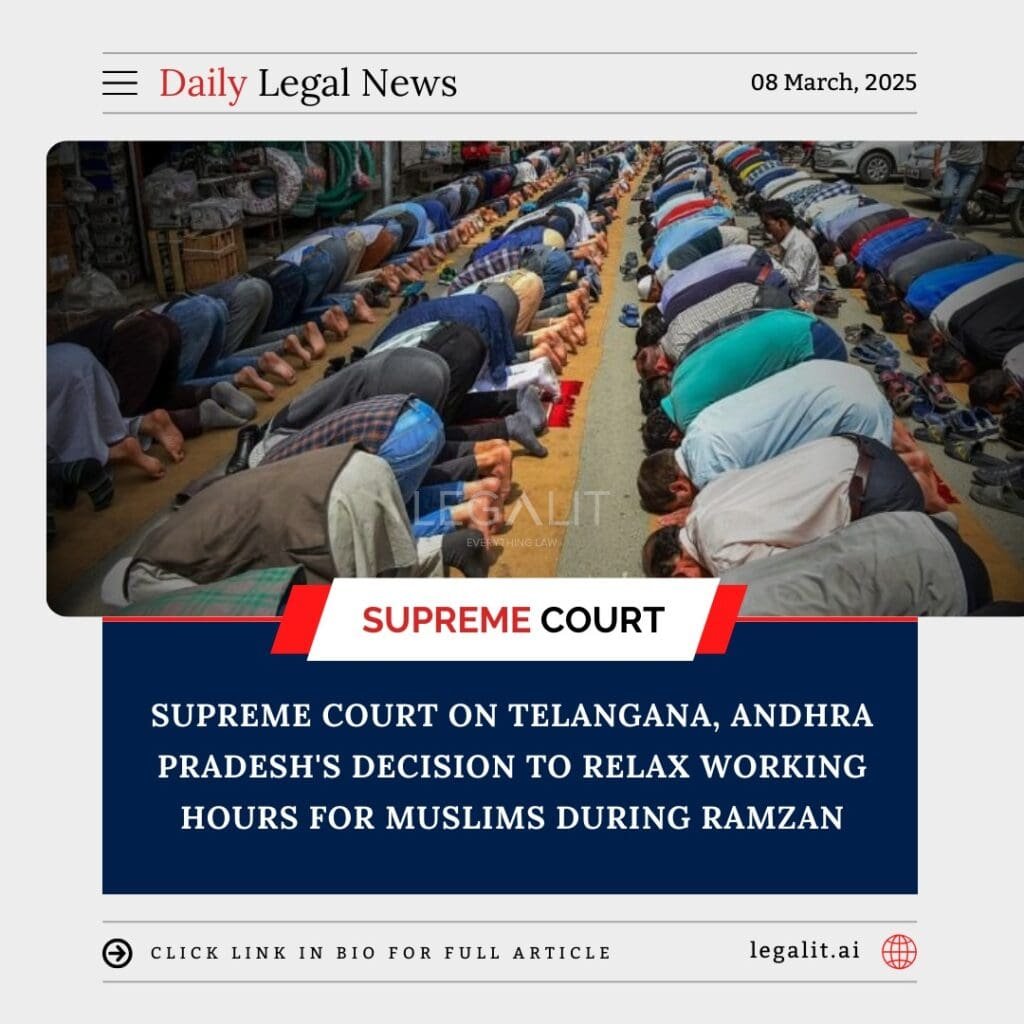
Background
The Supreme Court recently declined to entertain a petition challenging the decision of the Andhra Pradesh and Telangana governments to allow Muslim employees to leave work an hour early during the holy month of Ramzan. The petition had argued that such a move was discriminatory and violated the constitutional principle of equality by granting special privileges based on religion.
The governments of Telangana and Andhra Pradesh had issued circulars permitting Muslim employees in state departments, educational institutions, and public sector undertakings to leave work early at 4:00 PM during Ramzan. The rationale behind this relaxation was to facilitate religious observances, including fasting and evening prayers.
A public interest litigation (PIL) was filed, contending that such exemptions for a specific religious community were unconstitutional. The petitioner claimed that the decision violated Articles 14 (right to equality) and 15 (prohibition of discrimination) of the Indian Constitution.
Court’s Rationale
When the matter came before the Supreme Court, a bench led by Chief Justice Sanjiv Khanna and Justice Sanjay Kumar examined the arguments and observed the following:
- Jurisdictional Issue
- The Supreme Court noted that the circulars in question were issued by state governments.
- It suggested that the petitioner should approach the respective high courts (Telangana and Andhra Pradesh High Courts) rather than seeking direct intervention from the apex court.
- Executive Discretion in Religious Accommodations
- The court acknowledged that state governments have certain discretionary powers to make administrative decisions that accommodate religious and cultural practices, provided they do not infringe on the rights of others.
- It pointed out that similar accommodations have been made in the past for other religious communities, such as holidays for Hindu and Christian festivals.
- No Immediate Constitutional Violation
- The bench did not find an immediate and clear violation of constitutional principles, particularly since the relaxation applied only for a limited period and did not affect non-Muslim employees.
- The Supreme Court, therefore, did not find a compelling reason to intervene at this stage.
Following the court’s observations, the petitioner’s counsel chose to withdraw the plea with the liberty to approach the relevant high courts under Article 226 of the Constitution.
Implications of the Judgment
- For Muslim Employees – The decision allows government-employed Muslim workers in Telangana and Andhra Pradesh to continue availing of the relaxation during Ramzan without immediate legal hurdles.
- For Petitioners – Those who oppose such religious accommodations may now challenge them in the respective high courts, where a more detailed examination of their constitutionality may take place.
- For State Governments – The ruling affirms that state authorities have the discretion to introduce policy relaxations for specific communities, provided they do not violate broader constitutional principles.
Conclusion
By refusing to intervene, the Supreme Court has left it to the high courts to decide whether the decision to relax working hours during Ramzan is constitutionally valid. This case highlights the ongoing debate over the extent to which the state can accommodate religious practices while maintaining the secular fabric of governance. The upcoming proceedings in the high courts will determine whether such relaxations will continue in the long run or be subjected to further legal scrutiny.